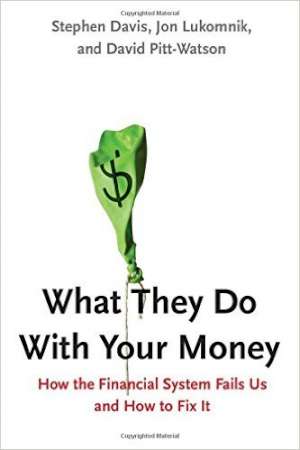09 November 2016
What they Do with your Money
How the financial System Fails us and How to Fix it
Stephen Davis, Jon Lukomnik and David Pitt-Watson
2016, Yale University Press, 256 pages,
ISBN 9780300194418
Reviewer: Vicky Pryce, Board member of CEBR

I first met David Pitt-Watson when I was helping to create Good Corporation, a company focussing on corporate social responsibility and he was running the Hermes shareholder activist funds in Europe. He brings huge amount of practical experience of the asset management sector.
This book with his academic co-authors is persuasive and at the same time deeply worrying. We spend too much on fees which are unjustified and not transparent. The authors quote work by Thomas Philippos of New York University that suggests that since the late 19th century the industry has more or less consistently charged around 2% for each dollar it intermediates. This has, if anything risen somewhat in the past 30 years despite global trends that should have made the sector much more efficient. And we are talking billions of costs here to the user of services, representing a substantial loss to the productive capacity of the world economy. And any productivity gains that may have been made appear to have been distributed within the industry itself rather than to the people who use the services .
It appears that one of the problems is that we trust the experts. Thankfully this time it is not an attack on economists that we are by now all getting used to. Instead the problem seems strangely to lie in too much specialisation. Markets cannot clear in an efficient way if there isn’t enough knowledge and transparency. This can lead to what the authors term ‘The Tyranny of the Experts’ and a financial system that can be ‘institutionally corrupt’. What they mean is that the incentives in place work to enrich the players themselves rather than their clients.
But the book doesn’t stop there. Shareholder activism has been encouraged and is rising but the investors still fail to hold companies to account. One excuse given is concern about the interpretation of ‘fiduciary duties’ which makes investing institutions focus mainly on the current returns to shareholders and rather less on longer term environmental, social and governance considerations. And the financial agents’ incentives also tend to favour short term gain. The result is that firms are not put under enough pressure to change behaviour, improve governance and ensure future sustainability. Practices such executive pay excesses remain in general unconstrained.
What the book advocates is a development of a new citizen investors’ charter, a ‘Magna Carta’ of what we should expect of financial institutions underpinned by regulation that clarifies ‘who owes royalty to whom up and down the investment chain’ and that infuses ‘good governance from top to bottom’. This should allow the system to return to the fundamentals of what it is meant to do. This is, as the authors remind us, to offer a safe space where money/wealth can be stored; an efficient payment system; reliable channels for intermediation to allow borrowing and lending; and a way to manage exposure to risk. It is only in that way that trust can be regained. And there is no reason why concentrating on those core principles should not allow for healthy profits still to be made.
